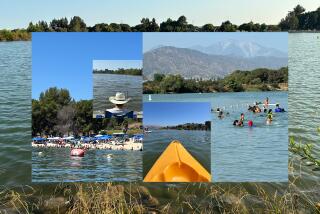Office Complex Casts a Lure at Fly-Fishing Aficionados
- Share via
IRVINE — Jay Fulcher loves to fish. But merely fishing isn’t enough. His craving is the Zen-like art of fly -fishing, whether he’s casting in the mountains of Montana--or at his office complex in Irvine.
Amid the gleaming glass towers of a row of executive office buildings in suburban Orange County, fly-fishing may soon become a during-work, after-work or weekend pursuit.
It’s the long-sought goal of Diane Scott, the property manager of Lakeshore Towers, to clean up the man-made lake that serves as the elegant centerpiece to the sprawling business park, so the 800 people who work there won’t have to go to Idaho or Montana to fish.
“It’s great. It’s terrific,” said the 33-year-old Fulcher, a software engineer. “Any time you incorporate leisure activity into things that are purely work-related, I see it as a very good thing. I’m an avid fly fisherman, but it takes hours of difficult practice. If nothing else, this could become a great place to practice.”
“More than anything,” said Douglas Hamilton, 34, a civil engineer who works in the building, “it reminds you that there are other things besides work. That’s something people tend to forget, and especially in this day and age, need to be reminded of.”
Added Reagan Stiva, one of Scott’s engineers: “Can you imagine being able to take a break from lunch just to throw a fly around? They’ll love it!”
Of course, Scott and her people will have to obtain the proper permits from the state Department of Fish and Game, which allows fishing in urban streams throughout California.
So, sometime after the lake is stocked with baby bluegill and bass--starting about a month from now--Lakeshore Towers could become Orange County’s answer to “The American Sportsman.”
Philosophically, Scott views the effort to merge exotic activities such as fly-fishing with the toils of the workday experience as being “hugely important, especially in today’s economy. At a time when everybody is fighting for tenants, [office workers] want to be able to come to work and feel like they’re getting immense value out of a well-rounded experience. In the ‘90s, for office managers like myself, tenant retention is everything.”
Joel Pugh, Scott’s chief engineer, said the collective aim of the management team is to provide as much “centralized pleasure” as possible for the 40 companies that lease space, “whether it’s volleyball, a nice restaurant, a gourmet coffee shop, a dry cleaners or a lake filled with fish.”
Even so, having a lake at the workplace--much less one that strives to be user-friendly to fly-fishing workaholics--strikes sociologist Gordon Clanton as having more to do with cultural trends than recreational pastimes.
“As work becomes more demanding, people are becoming far more ingenious in arranging recreational activities in ways that can be compatible with work commitments,” said Clanton, who teaches at San Diego State University.
“This, in its own way, is also related to cocooning,” Clanton said. “It’s consistent with the notion of finding pleasure at home, or at work, in a world where going out, traveling--really getting away, free of cellular phones and pagers--is increasingly more difficult.”
Before there could be fish, however, there had to be a lake, and that’s where Scott discovered problems. Shortly after Lakeshore Towers opened in 1991, the 1.6-million-gallon, concrete-bottomed lagoon began to turn brown and smell.
Chemicals used by Scott and her colleagues to remove massive quantities of algae only made the algae even thicker. In desperation, Scott hired an Irvine-based environmental firm, Ecoquatics, which spent a year ridding the lake of surging nitrate and phosphate levels through a chemical-free process that relies almost exclusively on a rich variety of plant life.
Thus, Scott has been able to satisfy the wishes of many of the attorneys, accountants, energy executives and computer magnates who occupy the office suites and wanted to be able to gaze out their tinted windows and see the bottom of a clear, cool stream.
But many, Scott said, also wanted to see fish darting about, and still others expressed a wish to actually be able to fish-- fly -fish, that is, in the way made popular by “A River Runs Through It,” Hollywood’s 1992 treatment of the Norman Maclean novel, directed by Robert Redford.
By fall, Ecoquatics hopes to begin stocking the lake with bluegill and bass and even a few trout, although Shelly Solomon, the founder and president of Ecoquatics, noted that they require a cold-water stream of no more than 76 degrees and actually prefer waters no warmer than 62 degrees.
Despite the enthusiasm of most tenants, some have their eyebrows arched.
“I don’t know, it seems so ridiculous,” said administrative assistant Jennifer Freiholtz, 21. “It’s kind of a shock, the thought of people out here fishing. I guess what I’m struck with is that some of these people don’t seem to want to go home--to ever leave the office.
“It’s like they can’t get enough of the place,” she said. “Next thing you know, we’ll have beds in the suites, or people will actually take vacations here. I guess this falls into the category of ‘Only in California.’ How else can you explain it?”
More to Read
Sign up for The Wild
We’ll help you find the best places to hike, bike and run, as well as the perfect silent spots for meditation and yoga.
You may occasionally receive promotional content from the Los Angeles Times.






